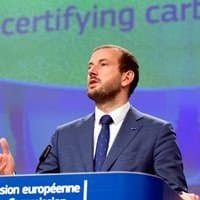(BRUSSELS) – The Commission proposed Wednesday new EU-wide rules to reduce packaging waste, promote reuse and refill, increase the use of recycled plastics, and make it easier to recycle packaging.
“Each day we produce half a kilogram of packaging waste per person,” said Environment Commissioner Virginijus Sinkevicius: “With the new rules we propose crucial steps to make sustainable packaging the norm in the EU. We will create the right conditions for the circular economy principles – reduce, reuse, recycle – to work. More sustainable packaging and bioplastics are about new business opportunities in the green and digital transition, about innovation and new skills, local jobs and savings for consumers.”
On average, each European generates almost 180 kg of packaging waste per year. Packaging is one of the main users of virgin materials as 40% of plastics and 50% of paper used in the EU is destined for packaging. The EU executive says that without action, the EU would see a further 19% increase in packaging waste by 2030, and for plastic packaging waste even a 46% increase.
The new rules aim to stop this trend. For consumers, they will ensure reusable packaging options, get rid of unnecessary packaging, limit overpackaging, and provide clear labels to support correct recycling. For the industry, they will create new business opportunities, especially for smaller companies, decrease the need for virgin materials, boosting Europe’s recycling capacity as well as making Europe less dependent on primary resources and external suppliers. They will put the packaging sector on track for climate neutrality by 2050.
The Commission also wants to bring clarity to consumers and industry on biobased, compostable and biodegradable plastics: setting out for which applications such plastics are truly environmentally beneficial and how they should be designed, disposed of and recycled.
The proposed revision of the EU legislation on Packaging and Packaging Waste aims to prevent the generation of packaging waste: reduce it in quantity, restrict unnecessary packaging and promote reusable and refillable packaging solutions; boost high quality (‘closed loop’) recycling: make all packaging on the EU market recyclable in an economically viable way by 2030; and to reduce the need for primary natural resources and create a well-functioning market for secondary raw materials, increasing the use of recycled plastics in packaging through mandatory targets.
The headline target is to reduce packaging waste by 15% by 2040 per Member State per capita, compared to 2018. This would lead to an overall waste reduction in the EU of some 37% compared to a scenario without changing the legislation. It will happen through both reuse and recycling.
- To foster reuse or refill of packaging, which has declined steeply in the last 20 years, companies will have to offer a certain percentage of their products to consumers in reusable or refillable packaging, for example takeaway drinks and meals or e-commerce deliveries. There will also be some standardisation of packaging formats and clear labelling of reusable packaging.
- To address clearly unnecessary packaging, certain forms of packaging will be banned, for example single-use packaging for food and beverages when consumed inside restaurants and cafes, single-use packaging for fruits and vegetables, miniature shampoo bottles and other miniature packaging in hotels.
- Many measures aim to make packaging fully recyclable by 2030. This includes setting design criteria for packaging; creating mandatory deposit return systems for plastic bottles and aluminium cans; and making it clear which very limited types of packaging must be compostable so that consumers can throw these to biowaste.
- There will also be mandatory rates of recycled content that producers have to include in new plastic packaging. This will help turn recycled plastic into a valuable raw material as already shown by the example of PET bottles in the context of the Single-Use Plastics Directive.
The proposal will clear up confusion on which packaging belongs to which recycling bin. Every piece of packaging will carry a label showing what the packaging is made of and in which waste stream it should go. Waste collection containers will carry the same labels. The same symbols will be used everywhere in the EU.
By 2030, the proposed measures would bring greenhouse gas emissions from packaging down to 43 million tonnes compared to 66 million if the legislation is not changed the reduction is about as much as the annual emissions of Croatia. Water use would be reduced by 1.1 million m3. The costs of environmental damage for the economy and society would be reduced by 6.4 billion relative to the baseline 2030.
Single-use packaging industries will have to invest into a transition, but the overall economic and job creation impact in the EU is positive. Boosting reuse alone is expected to lead to more than 600,000 jobs in the reuse sector by 2030, many of them at local small and medium sized companies. We expect much innovation in packaging solutions making it convenient to reduce, reuse and recycle. Measures are also expected to save money: each European could save almost 100 per year, if businesses translate savings to consumers.
Biomass used to produce biobased plastics must be sustainably sourced, with no harm to the environment and in respect of the ‘cascading use of biomass’ principle: producers should prioritise the use of organic waste and by-products as feedstock. In addition, to fight greenwashing and avoid misleading consumers, producers need to avoid generic claims on plastic products such as ‘bioplastics’ and ‘biobased’. When communicating on biobased content, producers should refer to the exact and measurable share of biobased plastic content in the product (for example: ‘the product contains 50% biobased plastic content’).
Biodegradable plastics need to be directed to specific applications where their environmental benefits and value for the circular economy are proven. Biodegradable plastics should by no means provide a licence to litter. Also, they must be labelled to show how long they will take to biodegrade, under which circumstances and in which environment. Products that are likely to be littered including those covered by the Single-Use Plastics Directive cannot be claimed to be or labelled as biodegradable.
Industrially compostable plastics should only be used when they have environmental benefits, they do not negatively affect the quality of the compost and when there is a proper biowaste collection and treatment system in place. Industrially compostable packaging will only be allowed for tea bags, filter coffee pods and pads, fruit and vegetable stickers, and very light plastic bags. The products must always specify that they are certified for industrial composting, in line with EU standards.
EU policy framework on biobased, biodegradable and compostable plastics
Proposal for a revision of EU legislation on Packaging and Packaging Waste
Regulation on Packaging and Packaging Waste - guide
Questions and Answers on Biobased Plastics
Factsheet on Packaging and Biobased Plastics
EU Certification of Carbon Removals - guide








